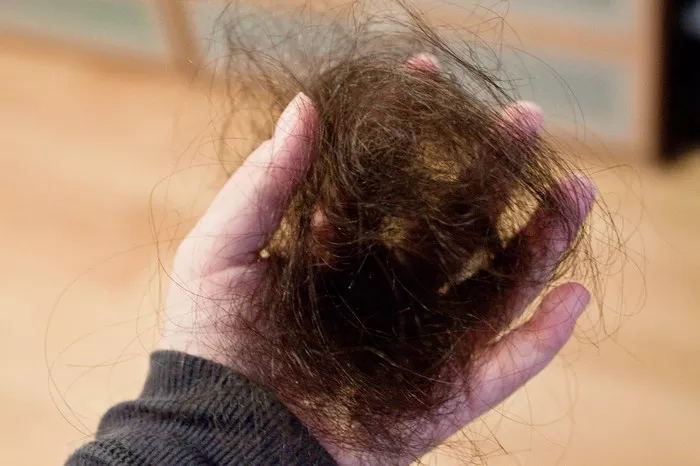Are you noticing a few extra strands of hair in your brush or on your pillow lately? The thought has crossed your mind: could losing hair be an early sign of pregnancy? Well, you’re not alone. Many expectant mothers have experienced this phenomenon. In this comprehensive guide, we will delve into the intriguing topic of hair loss during pregnancy and whether it can serve as an early indicator of pregnancy. So, let’s unravel the mysteries and explore this phenomenon further.
Hair Loss and Pregnancy: The Connection
Is there really a link between hair loss and pregnancy? You might be surprised to know that the answer is yes. Pregnancy is a time of immense hormonal fluctuations, and these hormonal changes can indeed impact the health of your hair. It’s all tied to the hormone known as estrogen.
See Also: The Alopecia Areata: What Causes Round Patches of Hair Loss?
Estrogen’s Role in Hair Health
Estrogen, often referred to as the “female hormone,” plays a pivotal role in maintaining luscious locks. During pregnancy, your estrogen levels soar, contributing to thicker and more vibrant hair. However, this doesn’t mean you’re immune to hair changes. In fact, some pregnant women experience an increase in hair thickness, while others face the opposite scenario.
Telogen Effluvium: A Common Culprit
Telogen effluvium is a temporary type of hair loss that can be triggered by various factors, including hormonal changes during pregnancy. Let’s delve into this in more detail.
1. Telogen Effluvium Explained
Telogen effluvium occurs when more hair follicles enter the resting phase, causing increased hair shedding. It’s crucial to understand that this condition is temporary and reversible.
2. Hormonal Influence on Telogen Effluvium
Hormonal fluctuations, such as those experienced during pregnancy, can send hair follicles into the resting phase prematurely. This is often a contributing factor to hair loss in expectant mothers.
When Does Hair Loss Occur in Pregnancy?
Now that we’ve established a connection between pregnancy and hair loss, it’s time to delve into the timing of this phenomenon.
1. First Trimester Hair Changes
During the first trimester, some women may notice an improvement in the texture and thickness of their hair, thanks to surging estrogen levels. However, for others, this can also be a time when hair loss becomes noticeable.
2. Postpartum Shedding
While we’re on the topic of pregnancy and hair, it’s essential to mention postpartum shedding. After giving birth, many women experience increased hair shedding. This can be alarming, but it’s usually just your body returning to its pre-pregnancy hormonal state.
Postpartum shedding typically occurs around three to six months after giving birth, and it can last for several months. It’s a natural part of the post-pregnancy experience.
Coping with Pregnancy-Related Hair Loss
Now that you’re aware of the possibility of hair loss during pregnancy, it’s time to explore some strategies for coping with this issue.
1. Maintain a Healthy Diet
A nutritious diet rich in vitamins and minerals can help support hair health. Foods like eggs, leafy greens, and salmon are packed with nutrients that promote strong, shiny hair.
2. Gentle Hair Care
During pregnancy, it’s essential to treat your hair gently. Avoid excessive heat styling, tight hairstyles, and harsh chemicals that can further damage your hair.
3. Consult a Healthcare Professional
If you’re concerned about your hair loss or its impact on your self-esteem, don’t hesitate to speak with your healthcare provider. They can offer guidance and rule out any underlying medical conditions contributing to the issue.
Conclusion
In conclusion, while losing hair can be a disconcerting experience during pregnancy, it’s essential to remember that it’s a common occurrence for many expectant mothers. The hormonal changes your body undergoes can indeed affect the health of your hair, but in most cases, this hair loss is temporary.
Maintaining a healthy lifestyle, including a well-balanced diet and gentle hair care practices, can help mitigate the effects of pregnancy-related hair loss. And always remember, consulting with a healthcare professional is a wise step if you have concerns about your hair or its impact on your overall well-being.
In the grand journey of pregnancy, experiencing changes in your hair is just one part of the beautiful transformation your body undergoes. Embrace these changes, and soon enough, you’ll be celebrating the arrival of your little one, with the worries of hair loss left far behind.


